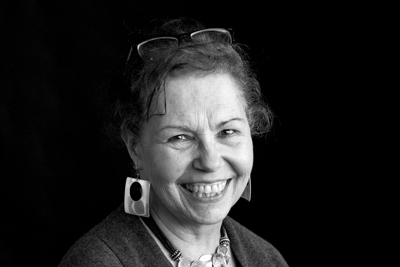
Margaret Barton-Burke is the Mary Ann Lee Endowed Professor of Oncology Nursing at UMSL. (Photo by August Jennewein)
Margaret Barton-Burke has been an oncology nurse for more than 35 years. But it wasn’t exactly a career path she grew up dreaming about. Actually, it was more or less preordained.
“I grew up during a time when girls would either become teachers or nurses,” says Barton-Burke, the Mary Ann Lee Endowed Professor of Oncology Nursing at the University of Missouri–St. Louis. “So my sister became the teacher, and I became the nurse.”
She was a first-generation college student, like many of the students she teaches at UMSL. In 2002, she earned a doctoral degree in psychosocial nursing from the University of Rhode Island in Kingston. Barton-Burke joined the UMSL faculty in 2008, and she leads the annual Knowledge is Power conference on black women and breast cancer and oversees the Black Women Breast Cancer Survivor Project at UMSL. Through the project, Barton-Burke researches disparities in the resources available to black women and their needs after diagnosis.
Is there something that drives you to continue to learn more and do more research on breast cancer?
When I was working as a nurse I saw the existential plight of individuals who were diagnosed with cancer. By that I mean learning to live every day as if it were your last day because it could be your last day of life. I don’t want to sound morbid, but my patients taught me how to live and love life. I find both the biology as well as the psychosocial aspects of the disease fascinating and intriguing. I say “intriguing,” because it seems with cancer – just when caregivers think they know and understand what is going on within the patient – the disease changes or we learn more about its biological basis.
Your focus has been on black women. What drew you to this group of cancer survivors?
I love to tell this story! My dissertation research was conducted with white women breast cancer survivors mostly because it was a convenient, albeit purposeful, sample willing to participate in my research. I defended my dissertation, and a member of my committee from the psychology department asked me when I was going to write my book. I remember saying to him that I really only had one perspective of breast cancer survivorship and that I really could not write a book until I had a variety of survivorship perspectives. I really thought that I would conduct my research with specific populations of breast cancer survivors (i.e., African American, Hispanic and Asian) and then write my book. My first study after dissertation was with black women breast cancer survivors, and I found that there was so much more work that needed to be done with this population that I just decided that this would become my life’s work.
What have you learned about black women and cancer? How do their experiences differ from those of other women?
The experience of black women differs from that of white women in several dimensions: economic, social and spiritual existential. But essentially, the disease is the disease, and the treatment is the treatment – not really different for either group. One exception is that we are learning more about a type of breast cancer called “triple negative breast cancer” that black women are diagnosed with at a higher frequency than white women. It is a more virulent form of cancer and more difficult to treat.
A lot of money, time and effort has been dedicated to cancer drugs, research and awareness. What more is needed?
I think the next stage is the genetics work and trying to understand how and if the disease is biologically different in different subsets of women. Treatment in the future will be tailored to the genetic and biological differences.
This story was originally published in the spring 2012 issue of UMSL Magazine.














